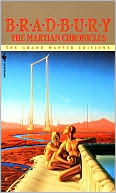
The Martian Chronicles(elib.cc) PDF
Preview The Martian Chronicles(elib.cc)
From "Rocket Summer" to "The Million-Year Picnic," Ray Bradbury's stories of the colonization of Mars form an eerie mesh of past and future. Written in the 1940s, the chronicles drip with nostalgic atmosphere--shady porches with tinkling pitchers of lemonade, grandfather clocks, chintz-covered sofas. But longing for this comfortable past proves dangerous in every way to Bradbury's characters--the golden-eyed Martians as well as the humans. Starting in the far-flung future of 1999, expedition after expedition leaves Earth to investigate Mars. The Martians guard their mysteries well, but they are decimated by the diseases that arrive with the rockets. Colonists appear, most with ideas no more lofty than starting a hot-dog stand, and with no respect for the culture they've displaced.
Bradbury's quiet exploration of a future that looks so much like the past is sprinkled with lighter material. In "The Silent Towns," the last man on Mars hears the phone ring and ends up on a comical blind date. But in most of these stories, Bradbury holds up a mirror to humanity that reflects a shameful treatment of "the other," yielding, time after time, a harvest of loneliness and isolation. Yet the collection ends with hope for renewal, as a colonist family turns away from the demise of the Earth towards a new future on Mars. Bradbury is a master fantasist and The Martian Chronicles are an unforgettable work of art. --Blaise Selby
Review'The bitter irony of The Martian Chronicles is both stark and shocking' Guardian 'As a science fiction writer, Ray Bradbury has long been streets ahead of anyone else' Daily Telegraph 'The sheer velocity of his words is an apocalyptic torrent which sweeps the reader on' Independent 'No other writer uses language with greater originality and zest. he seems to be a American Dylan Thomas' Sunday Telegraph
Amazon.com ReviewFrom "Rocket Summer" to "The Million-Year Picnic," Ray Bradbury's stories of the colonization of Mars form an eerie mesh of past and future. Written in the 1940s, the chronicles drip with nostalgic atmosphere--shady porches with tinkling pitchers of lemonade, grandfather clocks, chintz-covered sofas. But longing for this comfortable past proves dangerous in every way to Bradbury's characters--the golden-eyed Martians as well as the humans. Starting in the far-flung future of 1999, expedition after expedition leaves Earth to investigate Mars. The Martians guard their mysteries well, but they are decimated by the diseases that arrive with the rockets. Colonists appear, most with ideas no more lofty than starting a hot-dog stand, and with no respect for the culture they've displaced.
Bradbury's quiet exploration of a future that looks so much like the past is sprinkled with lighter material. In "The Silent Towns," the last man on Mars hears the phone ring and ends up on a comical blind date. But in most of these stories, Bradbury holds up a mirror to humanity that reflects a shameful treatment of "the other," yielding, time after time, a harvest of loneliness and isolation. Yet the collection ends with hope for renewal, as a colonist family turns away from the demise of the Earth towards a new future on Mars. Bradbury is a master fantasist and The Martian Chronicles are an unforgettable work of art. --Blaise Selby
Review"Bradbury is an authentic original."—_Time _magazine
https://elib.cc 百万电子书免费下载